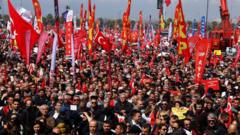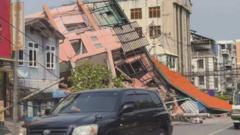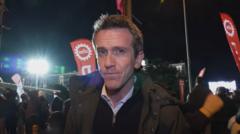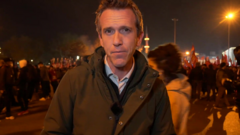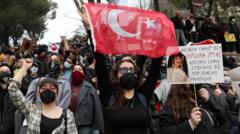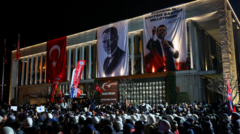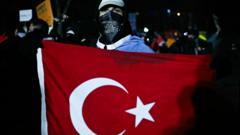Mark Lowen's dramatic detention and deportation from Turkey sheds light on the escalating tension following anti-government protests and the challenges journalists face in the country’s tumultuous political landscape.
Deportation Dilemma: BBC’s Mark Lowen Reflects on Turkey’s Political Climate

Deportation Dilemma: BBC’s Mark Lowen Reflects on Turkey’s Political Climate
Mark Lowen, a BBC correspondent, offers a first-hand account of his recent deportation from Turkey amid protests against government actions.
In Istanbul, amidst a climate of unrest, BBC journalist Mark Lowen experienced a sudden twist of fate. After sending a cheerful message to his family about his return to Turkey, he received an unexpected call from his hotel’s receptionist requesting an urgent in-person discussion. This led to a five-hour ordeal in which plain-clothed policemen detained him while covering protests ignited by the arrest of Ekrem Imamoglu, the city’s mayor and opposition figure.
Lowen, who had previously reported from Turkey, was first taken to police headquarters where, despite an initial cordial atmosphere, he was later transferred to the airport's custody unit. Here, he faced a harsher environment, stripped of legal access and subjected to fingerprinting as authorities prepared his deportation under the pretext of being a threat to public order. Even as the government claimed he lacked the proper accreditation, this reasoning seemed to be an afterthought only after his detention sparked global media attention.
Throughout the ordeal, Lowen felt supported by his employer and the British Consulate but remained acutely aware of the plight of less fortunate journalists in Turkey, a country notorious for imprisoning reporters as noted by Reporters Without Borders. The ongoing protests reflect a growing demand for democracy in a nation increasingly leaning toward authoritarian rule under President Recep Tayyip Erdogan.
Erdogan, now in power for over 20 years, has dismissed the demonstrations as a form of “street terrorism,” leveraging his geopolitical significance to remain fortified against international criticism. As citizens flood the streets calling for change, questions loom about whether this movement will sustain its momentum or be subdued by the government’s might. While protesters persist, they are also reminded of the formidable force that Erdogan represents in Turkey's political arena.
Lowen, who had previously reported from Turkey, was first taken to police headquarters where, despite an initial cordial atmosphere, he was later transferred to the airport's custody unit. Here, he faced a harsher environment, stripped of legal access and subjected to fingerprinting as authorities prepared his deportation under the pretext of being a threat to public order. Even as the government claimed he lacked the proper accreditation, this reasoning seemed to be an afterthought only after his detention sparked global media attention.
Throughout the ordeal, Lowen felt supported by his employer and the British Consulate but remained acutely aware of the plight of less fortunate journalists in Turkey, a country notorious for imprisoning reporters as noted by Reporters Without Borders. The ongoing protests reflect a growing demand for democracy in a nation increasingly leaning toward authoritarian rule under President Recep Tayyip Erdogan.
Erdogan, now in power for over 20 years, has dismissed the demonstrations as a form of “street terrorism,” leveraging his geopolitical significance to remain fortified against international criticism. As citizens flood the streets calling for change, questions loom about whether this movement will sustain its momentum or be subdued by the government’s might. While protesters persist, they are also reminded of the formidable force that Erdogan represents in Turkey's political arena.




